In today’s rapidly changing world, understanding the multifaceted challenges of climate change is more crucial than ever.
This article delves into a curated selection of online courses that aim to educate and empower individuals on various aspects of climate change.
These courses offer valuable insights into combating climate change, from the intersection of human rights and environmental impacts to the intricacies of sustainable development and energy systems within environmental constraints.
Designed for a diverse audience, including students, professionals, and activists, these courses provide the foundational knowledge and practical tools needed to navigate and contribute to global efforts against climate change.
Overview: Climate Change
This course is meticulously designed to provide a comprehensive understanding of climate change, its causes, impacts, and the global efforts required to combat it.
Ideal for students, professionals, and anyone interested in environmental science, this course explores the scientific basis of climate change, its effects on natural and human systems, and the strategies for mitigation and adaptation.
Through engaging lectures, case studies, and interactive discussions, participants will gain a deep understanding of one of the most pressing issues facing our planet today.
Course Syllabus Preview:
Our course syllabus is structured to ensure a thorough exploration of climate change from multiple perspectives. Here’s an outline of the major topics and their subtopics:
I. Introduction to Climate Change
- Understanding the Earth’s Climate System
- Historical Perspectives on Climate Change
- The Greenhouse Effect and Global Warming
II. Evidence of Climate Change
- Climate Data and Indicators
- Observing Changes in Weather Patterns, Ice Sheets, and Sea Levels
- Impacts on Biodiversity and Ecosystems
III. Causes of Climate Change
- Natural vs. Anthropogenic Factors
- The Role of Fossil Fuels and Deforestation
- Industrialization and Urbanization
IV. Climate Change Modeling and Predictions
- Climate Models and How They Work
- Future Climate Scenarios and Projections
- Uncertainty and Risk in Climate Predictions
V. Impacts of Climate Change
- On Natural Systems: Oceans, Forests, and Polar Regions
- On Human Systems: Agriculture, Health, and Economy
- Social and Environmental Justice Issues
VI. Mitigation Strategies
- Reducing Greenhouse Gas Emissions
- Renewable Energy Sources and Technologies
- Carbon Sequestration and Capture
VII. Adaptation to Climate Change
- Building Resilient Communities and Ecosystems
- National and International Policy Responses
- The Role of Individuals and Communities in Adaptation
VIII. Global Climate Change Negotiations
- The United Nations Framework Convention on Climate Change (UNFCCC)
- Key Agreements: The Kyoto Protocol and The Paris Agreement
- Challenges and Opportunities in International Cooperation
What You Will Learn
By enrolling in this course, participants will gain:
- Scientific Understanding: A solid foundation in the science of climate change, including its causes and impacts.
- Global Awareness: Insights into how climate change affects different regions and populations worldwide.
- Mitigation and Adaptation Strategies: Knowledge of the strategies and technologies available to combat climate change.
- Policy and Negotiation Skills: An understanding of the global policy landscape, including key international agreements and negotiations.
- Actionable Solutions: The ability to identify and advocate for effective climate change solutions at the individual, community, and global levels.
This Course Includes:
- 18 Hours of On-Demand Video: Engaging video lectures that provide in-depth coverage of climate change topics.
- 7 Comprehensive Articles: Supplementary reading materials to enhance your understanding of climate science and policy.
- 12 Downloadable Resources: Access to data sets, policy documents, and tools to support your learning and advocacy efforts.
- Mobile and TV Access: Study from anywhere, anytime, with lessons available on both mobile and TV.
- Certificate of Completion: A testament to your dedication and newly acquired knowledge on climate change.
Top 5 Climate Change Courses for sustainability and a better future!
Here are the top 5 climate change courses offered by renowned institutes and organizations.
1. From Climate Science to Action: A Deep Dive into Climate Change
| Course Link | Here |
| Pricing | Free |
The course “From Climate Science to Action” offered by The World Bank Group on Coursera is a comprehensive program designed to equip learners with a deep understanding of climate science and the actionable steps necessary to combat climate change.
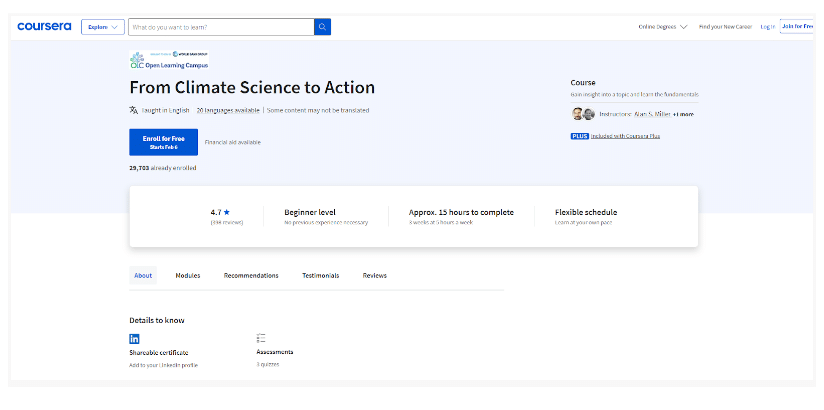
This course is structured to provide a blend of scientific evidence, regional impacts, and climate action strategies, making it an invaluable resource for anyone looking to contribute effectively to climate resilience and a low-carbon future.
Course Curriculum and Structure
The course spans approximately 15 hours over a period of 3 weeks, with a flexible schedule that allows participants to learn at their own pace.
It is divided into four detailed modules, each focusing on different climate science and action aspects.
Week 1: Climate Change in the 21st Century
- Historical and Projected Changes: Examination of observed changes in the climate system up to the 21st century.
- INDCs and Climate Action: Analysis of the Potential of Intended Nationally Determined Contributions submitted at COP 21.
- Climate Change Impacts: Discussion on the loss of Arctic sea ice, melting glaciers, heatwaves, and drought.
- Natural System Responses: Exploration of how warming could result in sea-level rise, extreme temperatures, and ocean acidification.
Week 2: Sectoral and Regional Impacts
- Development Sector Impacts: Insights into the impacts of warming on agricultural production, water resources, ecosystem services, and coastal vulnerability.
- Regional Analysis: Examination of climate trends and their effects across the world’s regions.
- The urgency of Action: Highlighting the risks that could reverse development gains and trap millions in poverty.
Week 3: From Science to Action on Climate Change
- Mitigation and Adaptation Actions: Discussion on region-specific mitigation actions needed to reduce emissions and build climate resilience.
- Expert Perspectives: Insights from regional experts on strategies and actions for a low-emissions, climate-resilient development path.
- NDCs and Paris Agreement: Reflections on the progress of Nationally Determined Contributions and Outcomes of the Paris Agreement.
Week 4: What You Can Do
- Global Scale Impact: Understanding the transformative impact of individual actions on a global scale.
- Rationale for Action: The importance of acting now, together, and differently.
- Policy Examples: Exploration of mitigation and adaptation policies and their benefits.
Unique Teaching Methodologies:
The course employs a variety of teaching methodologies to enhance the learning experience:
- Interactive Video Talks: Led by renowned climate scientists and practitioners, these talks provide comprehensive insights into each topic.
- Interactive Tools: Tools like the Carbon Footprint Tracker and (I) NDC platform help learners understand and engage with the content actively.
- Diverse Resources: A mix of core, optional, and fun interactive resources on each week’s theme supports deeper exploration of topics.
- Quizzes and Assignments: These elements are designed to test knowledge, reinforce material, and sharpen analytical and communication skills.
- Discussion Forums: Encourages networking and exchange of ideas among learners from diverse backgrounds.
2. ESG And Climate Change: Navigating Business Risks and Opportunities
| Course Link | Here |
| Pricing | Free |
The course “ESG and Climate Change” offered by the University of Pennsylvania on Coursera delves into the critical aspects of Environmental, Social, and Governance (ESG) factors in the context of climate change.
This course, taught by Sarah Light, aims to equip learners with the knowledge to understand the risks and opportunities climate change presents for businesses in the 21st century.
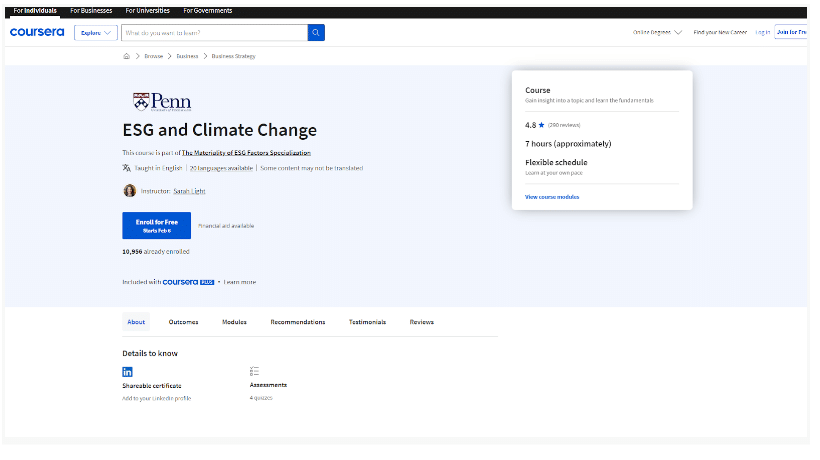
It explores the impacts of climate change on a global scale, the importance of climate disclosures in ESG, and the role of private environmental governance in combating climate change.
Course Curriculum and Structure
This course is structured to be completed in approximately 7 hours, offering a flexible learning schedule. It is divided into four modules, each focusing on ESG and climate change aspects.
Module 1: Introduction to Sustainability, Climate Risk & Opportunity
- Understanding Climate Change: Analyzes the current impacts of climate change globally and the shifts required for a zero-carbon economy.
- Stakeholder Influence: Examines who is driving business firms to focus on climate change.
- Financial Stability Risks: Discusses the physical and financial stability risks posed by natural disasters.
- Overview of Financial Impacts: Provides a detailed overview of the financial impacts of climate change, government actions, and the financial risks of unmitigated climate change.
Module 2: Public and Private Governance to Address Climate Change Goals
- Public Environmental Law: Takes an in-depth look at public environmental law and the eras shaping modern climate policy.
- Private Environmental Governance: Reviews the active role of private companies in combating climate change and parallels between public and private sectors.
- Climate Disclosures: Analyzes the role and importance of climate disclosures in ESG.
Module 3: Building Climate Resilience through Creative Private Solutions
- Ecosystem Services: Examines methods to promote climate resilience through ecosystem services.
- Insurance Industry: Assesses how the insurance industry spreads risk and creative ways it can build climate resilience.
Module 4: Greenwashing and Product Stewardship
- Understanding Greenwashing: Reviews what drives firms to make exaggerated environmental claims, why it’s harmful, and examples of enforcement actions.
- Importance of Product Stewardship: Learns about the significance of product stewardship in environmental governance.
Unique Teaching Methodologies
The course employs a variety of teaching methodologies to enhance the learning experience:
- Video Lectures: Concise video lectures provide foundational knowledge and insights into each topic.
- Readings: Supplementary readings offer depth and context for further exploration of topics.
- Quizzes: Quizzes at the end of each module reinforce learning and test knowledge.
3. Climate Change and Human Rights: Bridging Environment and Justice
| Course Link | Here |
| Pricing | Free |
The course “Climate Change and Human Rights,” available on Coursera and offered by New York University, explores the intricate relationship between climate change and human rights.
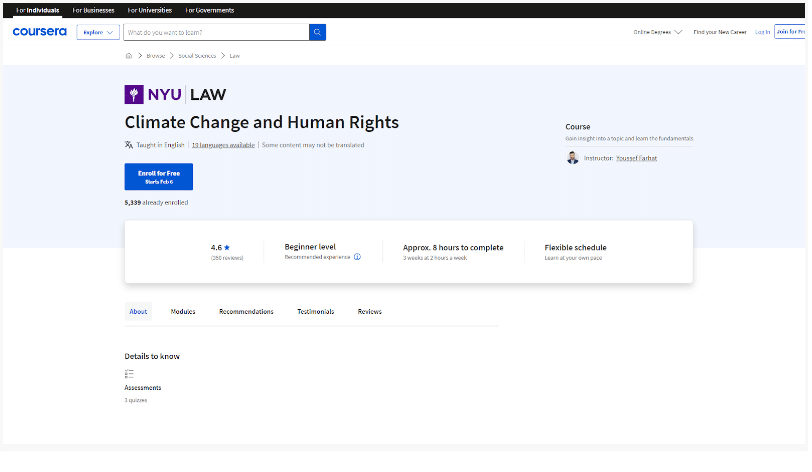
This course, under the guidance of César Rodríguez-Garavito, delves into how climate change poses significant global challenges to human rights and examines the legal and policy frameworks to address these challenges.
Course Curriculum and Structure
Designed to be accessible for beginners, this course requires approximately 8 hours to complete, spread over a flexible schedule.
It is structured to provide a comprehensive understanding of the field of climate change and human rights through detailed modules.
Module Overview (There is only 1 module in this course):
- Introduction to Climate Change and Human Rights: Offers an overview of the course, setting the stage for a deeper exploration of the intersection between climate change and human rights.
- Historical Context: Discusses the evolution of climate change as a human rights issue, providing a foundation for understanding its current significance.
- Key Cases and Trends: Explores pivotal legal cases and emerging trends in climate litigation and human rights.
- Current Challenges: Looks at the current state of climate change impacts on human rights and the legal and policy responses to these challenges.
- Future Directions: Provides insights into the future of climate change and human rights discourse, including potential legal and policy developments.
Unique Teaching Methodologies:
The course employs a range of teaching methodologies to ensure a comprehensive learning experience:
- Video Lectures: Short, engaging video lectures introduce key concepts and issues, making complex topics accessible to all learners.
- Case Studies: Detailed case studies offer real-world examples of how climate change impacts human rights, enhancing understanding through practical illustration.
- Interactive Quizzes: Quizzes throughout the course help reinforce learning, test knowledge, and provide immediate feedback.
- Supplementary Readings: Additional readings allow learners to dive deeper into specific topics, broadening their understanding of the subject matter.
4. Advancing Sustainable Development In Practice: A Comprehensive Course
| Course Link | Here |
| Pricing | Free |
The course “Advancing Sustainable Development in Practice” offered through UN CC: Learn is an advanced program designed to build upon introductory knowledge of sustainable development.
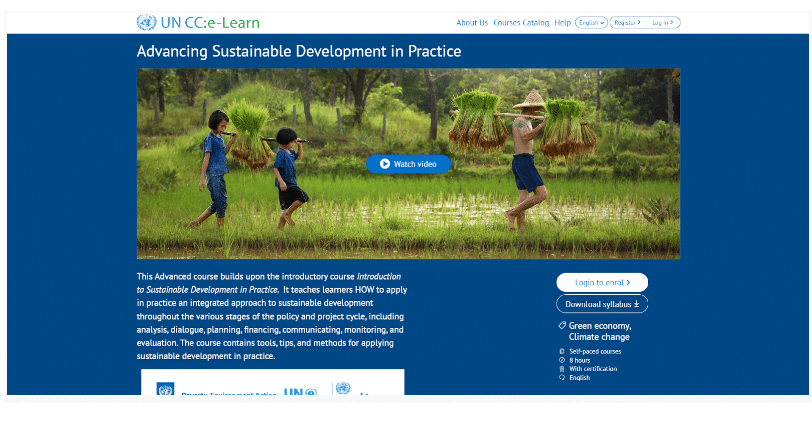
It focuses on applying an integrated approach to sustainable development throughout various stages of the policy and project cycle, including analysis, dialogue, planning, financing, communicating, monitoring, and evaluation.
This self-paced course, estimated to take around 8 hours to complete, is aimed at teaching learners the practical application of sustainable development tools, tips, and methods.
Course Curriculum and Structure
The course is structured around seven modules, each addressing a critical aspect of integrating environment, climate, and poverty reduction into development planning.
It is designed to provide an in-depth look at how to take an integrated approach to policy analysis, integrated planning, designing interventions, financing, communications, and monitoring and evaluation in the context of sustainable development.
Module 1: Analysing Poverty and Environment Issues
- Focuses on the analysis stage of the policy cycle, discussing various pathways, methods, and approaches for identifying and analyzing the interlinkages between poverty and environmental issues.
Module 2: Engagement and Dialogue
- Examines the processes of engagement and dialogue as crucial steps in shaping an integrated approach to address interlinked environment and poverty issues effectively for stakeholders.
Module 3: Integration into Planning Processes
- Deals with mainstreaming and integrating poverty and environmental objectives into the planning processes of a country.
Module 4: Financing Sustainable Development in Practice
- Delves into financing an integrated approach by looking at integrating poverty and environmental objectives into national budgets and public and private investment.
Module 5: Communications on Poverty and the Environment
- Explores the importance of communication and how poverty and environmental issues can be better framed to reach different stakeholders effectively.
Module 6: Monitoring and Evaluation
- Provides guidance on how monitoring and evaluation can help track the integration of poverty and environmental issues across the policy cycle.
Module 7: Building Integrated Transformative Institutions
- Equips learners with knowledge on how robust institutions can help integrate poverty and environmental issues, facilitating integrated sustainable development.
Unique Teaching Methodologies
The course employs a variety of teaching methodologies to ensure a comprehensive learning experience:
- Interactive Learning: Through tools, tips, and methods, the course offers an interactive way to apply sustainable development in practice.
- Expert Insights: Led by Steve Bass, Senior Associate at the International Institute for Environment and Development (IIED), and other experts, the course provides authoritative insights into sustainable development.
- Practical Application: The course contains practical exercises that allow learners to apply what they have learned in real-world scenarios.
5. Energy Within Environmental Constraints: A Harvard Course
| Course Link | Here |
| Pricing | Free |
“Energy Within Environmental Constraints,” offered through Harvard University’s online platform and available on edX, presents a quantitative introduction to the energy system and its environmental impacts.
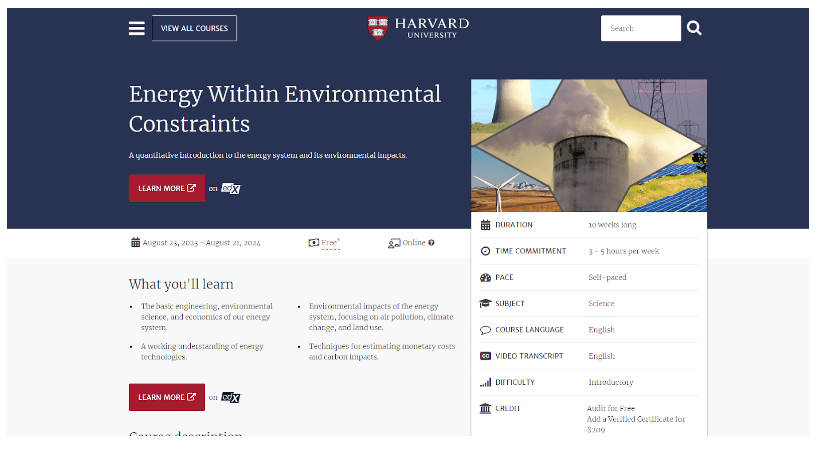
This course, spanning from August 23, 2023, to August 21, 2024, is designed to provide learners with a comprehensive understanding of our current energy system, its environmental consequences, and the economic considerations necessary for sustainable energy solutions.
Course Curriculum and Structure
This 10-week long course requires a commitment of 3 to 5 hours per week from participants.
It is structured to offer a deep dive into our energy system’s basic engineering, environmental science, and economics, alongside a working understanding of energy technologies and their environmental impacts, focusing on air pollution, climate change, and land use.
Key Topics Covered:
- Energy Overview: Forms of energy, common units of measurement, and how energy flows through modern and historical economies.
- Estimating Costs: Techniques for estimating monetary costs and carbon impacts of various energy systems.
- Environmental Impacts: Examination of the severity of air pollution, climate change, and land use impact today and in the future.
- Fossil Fuels: Abundance of fossil fuels and the implications for energy policy.
- The Electric Grid: Overview of modern electric grids, including major technologies, reliability, efficiency, and future changes.
- Solar Power: Current and future solar power technologies, cost estimation, and regulatory environment.
- Nuclear Power: Basics of nuclear fission, costs, usage trends, waste management, and safety concerns.
- Demand Reduction and Efficiency: Strategies for reducing energy demand and improving efficiency to mitigate environmental harms.
Unique Teaching Methodologies:
The course is rich in details of real devices and light on theory, making it accessible to a wide audience, including students, policymakers, business owners, and concerned citizens. It emphasizes:
- Quantitative Comparisons: Offering detailed comparisons and trade-offs between different energy sources and technologies.
- Cost Analysis: A focus on the cascade of capital and operating costs from energy extraction through end uses.
- Practical Application: Learners will find practical information about modern commercial solar panels, including profitability estimations based on location.
Instructors:
- David Keith: Gordon McKay is a professor of applied physics at the John A. Paulson School of Engineering and Applied Sciences and a professor of public policy at the Harvard Kennedy School.
- Daniel Thorpe is a research fellow focusing on energy and the environment.
Conclusion
In conclusion, these climate change courses offer a comprehensive and insightful exploration of our planet’s critical issues.
From understanding the intricate relationship between climate change and human rights to analyzing sustainable development practices and the environmental constraints on energy, these courses equip learners with the knowledge and tools necessary to make informed decisions and contribute to a sustainable future.
Whether you’re a student, professional, or simply a concerned citizen, engaging with these courses can deepen your understanding of climate change’s complexities and empower you to take action toward mitigating its impacts.
Article By

